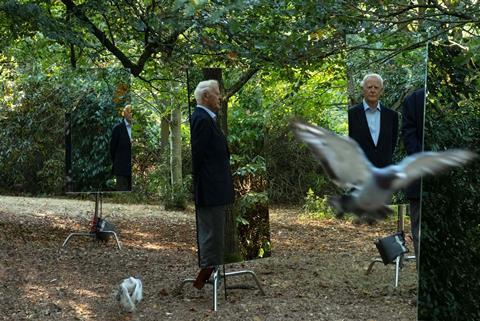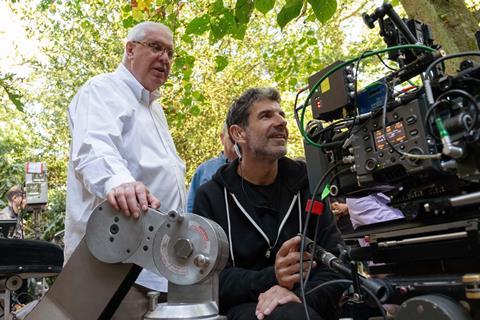Veteran documentarian Errol Morris tells Nicholas Barber why spy-fiction author John le Carré proved such an intriguing subject for his latest film, The Pigeon Tunnel.

Before David Cornwell became known around the world by his pen name John le Carré, he was a British intelligence officer who was sometimes involved in interrogations — so when he was interviewed by Errol Morris for documentary The Pigeon Tunnel, the author imagined that the process might be similar. “He started off in an adversarial position,” says Morris, “because that’s what he knows. He had talked about interviews as an interrogation in which you expose the lie, and let the other person know you’ve exposed the lie. Well, that’s not what I do. It’s never been what I do.”
Over four days of interviews in le Carré’s home in 2019, the award-winning author of The Spy Who Came In From The Cold, Tinker Tailor Soldier Spy and The Constant Gardener became more relaxed in the company of the award-winning director of Gates Of Heaven, The Thin Blue Line, The Fog Of War — and vice versa. “I liked and admired him,” Morris says, himself a waspish but jovial interviewee. “He was a man of actual principles and ethics. Extraordinarily well-read. And he was very much a kindred spirit. We had the same kind of obsessions with truth and investigation, the same kind of deep disappointment in the world.”
Focal point
It also helped that Morris did not want to dig up any dirt. He did not care about le Carré’s well-documented extramarital affairs, and he did not try to speak to anyone who might contradict the author’s own accounts of his past. “When I made the decision in The Fog Of War to interview one person [Robert McNamara] — and I did that again with Donald Rumsfeld [The Unknown Known] and Steve Bannon [American Dharma] — I realised that the interest is not in hearing what 10 people think about your protagonist, the interest is in hearing what the protagonist thinks about himself. And now I’ve done it with John le Carré. It’s not a contest of wills, it’s a discussion, an exploration of various themes in his life and in his work.”
The exploration began when Morris’s producer friend PJ van Sandwijk suggested that he read le Carré’s 2016 memoir The Pigeon Tunnel: Stories From My Life. The book covered the author’s time in MI5 and MI6, the success of his bestselling novels, and the influence of his astonishing, betrayal-filled childhood: his mother walked out when he was five and his father was an inveterate confidence trickster.
“I loved it,” Morris recalls. “I think it’s one of the best books, if not the very best book, that he’s ever written. I read it and all these images started flying through my head. I thought, ‘This is perfect for me.’ The fact that so much could be dramatised, illustrated, however you want to describe it. I thought that this was a story I could bring to life.”
Van Sandwijk was already in touch with The Ink Factory, the production company set up by le Carré’s sons Stephen and Simon Cornwell, so he made the introductions. “They were interested, their father was interested and Apple was interested,” Morris says, “so there you have all the necessary ingredients to make something happen.”
Not that the process went without a hitch. The initial agreement was that The Pigeon Tunnel would be a five-part series but, when the urbane conversations between these two master storytellers were done and dusted in 2019, there was seemingly prevarication at Apple Original Films.

“Part of the problem — and it’s been a problem throughout my career — is this question of, ‘What is this? What are you doing here? Is this a documentary? Is this a drama?’ I would say that I’m trying to create a hybrid art form that has elements of a lot of things in it — found footage, interviews, but interviews shot in a very dramatic and specific way, and dramatic material shot no differently than you would shoot a feature film.
“So I cast it, we storyboarded it, and then no-one at Apple would look at it,” Morris continues. “The script went to drama, and the interview [footage] went to documentary, but they didn’t talk to each other. It’s this odd disconnect. No-one was used to dealing with something like this. You know, years passed…”
Final interview
It was not until 2022 that a decision was finally made: The Pigeon Tunnel would not be a television series after all, but a standalone film — and this was two years after le Carré’s death at the age of 89 in 2020. His interviews with Morris turned out to be the last he ever gave.
How did it feel for Morris to edit out so much more of those interviews than he had initially planned? “Painful,” he says, “but I like what emerged. I could have made probably 20 films from The Pigeon Tunnel, there were so many great stories, but I think the film we made is extraordinarily rich. It’s awash with all kinds of philosophical ideas about history, about memory, about storytelling. I don’t want to over-promise you, but I actually may know what I’m doing!”
Morris has no complaints about the protracted production schedule, pointing out that when the time came, Apple stumped up all the money he needed to fly to Budapest and shoot dramatisations of le Carré’s reminiscences, and then enhance them with digital effects. “I’ve been told by the boys, Stephen and Simon, that [the film] cost around $10m,” he says. “Part of it is the length of time it took, and part of it is that drama is expensive. Roger Ebert once asked me, ‘What’s the difference between drama and documentary?’ And I said, ‘Well, that’s easy, two zeroes.’”
The Pigeon Tunnel premiered at Telluride and went on to tour the festival circuit before debuting on Apple TV+ on October 20, while also receiving an awards-qualifying theatrical release.
Unlike so many film veterans, Morris is enthusiastic about streaming services. They have, he says, changed the status of documentaries. “Think about how many documentaries have been made by Netflix alone, and think about how they’re exhibited. Years ago, you had an audience of a couple of hundred people, versus an audience of millions of people today, and that’s a big difference.
“I should have been out of business a thousand years ago but, much to my own amazement, I’m still a working filmmaker.”
This is something of an understatement. Morris has almost completed his next film Separated, about the separation of parents and children at the US-Mexico border, which should premiere at festivals early in 2024. He will then deliver a Netflix documentary based on Tom O’Neill’s 2019 book Chaos: Charles Manson, The CIA, And The Secret History Of The Sixties. And he is putting the finishing touches to a screenplay for a drama about Ed Gein, the convicted killer he interviewed in prison in 1975.
Le Carré was still writing novels right up to his final days. Will Morris, who is 75, likewise be making films for as long as possible? “I hope so,” he says. “I love filmmaking. It can be aggravating but I’ve always loved it, I still love it, and I have so many projects ready. As long as I can keep on working, I’m a happy camper.”















![[L-R]: Amanda Villavieja, Laia Casanovas, Yasmina Praderas](https://d1nslcd7m2225b.cloudfront.net/Pictures/274x183/6/4/1/1471641_pxl_20251224_103354743_618426_crop.jpg)









No comments yet